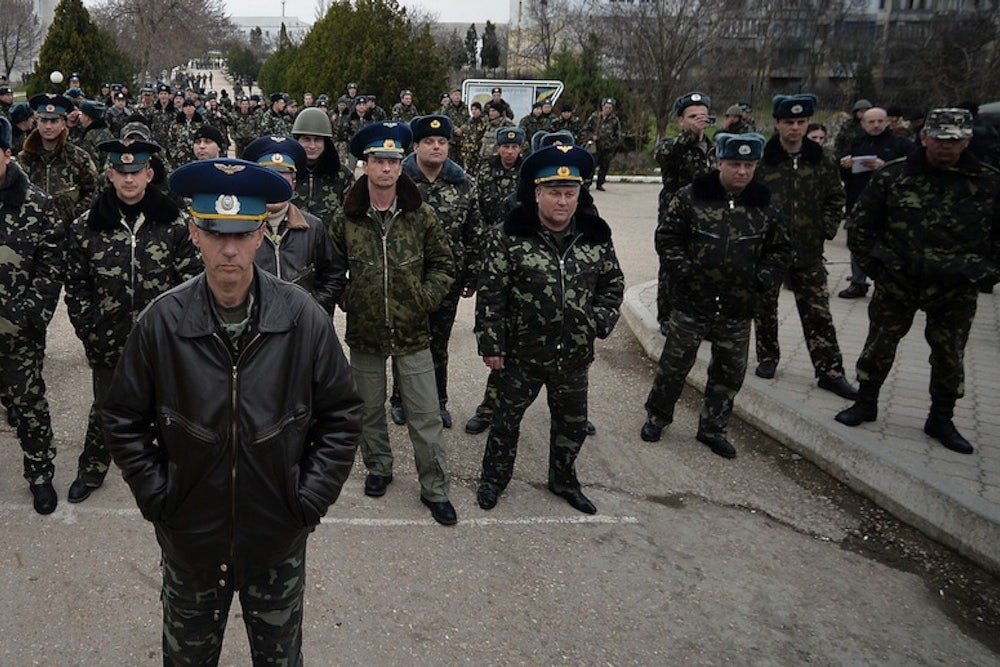The long-advertised Russian move to partition the Ukraine calls for a more serious response than empty words—it is unacceptable to declare “unacceptable” what is plainly being accepted without any effective response. Pathetically, the several European leaders who rushed to declare the Russian move “unacceptable” immediately added that they had no intention of doing anything about it. Our own Secretary of State John Kerry resorted to the playground threat of disinviting President Vladimir Putin from the next G-8 (G-7?) summit-party. Yes, they are great fun with all those group photographs and the food is excellent, but the Crimea is worth a tiramisu.
Actually the Crimea is not what the Russians want—they want much more. The “Novy Russia” plan prepared in the Kremlin—worked out in detail down to the design of its flag—would separate all the territory east of the great Dnieper River into a new state, “affiliated” with the Russian Federation, until its accession can be worked out in due course. This Trans-Dnieper territory is many times larger than the Trans-Dniestr republic (a.k.a. Republica Moldovenească Nistreană) that the Russians successfully sliced off the Moldovan Republic and keep till this day, but unlike the latter which is separated from the Russian Federation by Ukrainian territory, "Novy Russia" would seamlessly form its southern extension down to the Black Sea.
The Dnieper as a dividing border gives Crimea to Russia including its irreplaceable naval base, but mostly has the decisive advantage of enclosing a population that includes many ethnic Russians, many Russian-speaking Ukrainians, and many Ukrainians who see their future with Moscow because their livelihood depends on Russian firms or is in Russia itself. Certainly the outlook of the populations living east of the Dnieper is very different from the outlook of the protagonists of the revolt: the activists from Lviv, that city being the Lvov of Galicia that was only annexed in 1944, many of whose inhabitants are Uniate Catholics rather than Orthodox. Putin could therefore appeal to the impeccably Wilsonian principle of self-determination to legitimize his new state. Finally, the trans-Dnieper Novy Russia could still have Kiev as its capital in the three districts (raions) east of the great river, allowing the Ukrainians their Kyiv as their historic capital. Putin could even boast of his restraint in giving up Odessa, historically Russian but west of the Dnieper.
At home, certainly, Putin has nothing to worry about: Many Russians believe that all of the Ukraine should “return” to Russia, while the historically minded will recall that the original Novorossiya won from the Tatars extended across both sides of the Dnieper.
Americans and Europeans now face a hard choice: start a new “cold war” of routine non-cooperation with Moscow, or else join in the process of extracting a non-failed state out of Ukraine, by conducting referenda in the 24 oblasts (provinces) and the autonomous republic of Crimea.
Starting a new Cold War would have the advantage of moral clarity, and the disadvantage of dividing Europe: The Germans will not quarrel with Moscow no matter what—it would distract them from their economy-first national strategy. The re-engineering of the Ukraine would offer the promise of stability at last, with the major disadvantage of legitimizing Putin’s use of force. What offers no advantages at all is the repetition of empty phrases and childish threats.
Stay informed with The New Republic's Ukraine Newsletter. Sign-up here.
